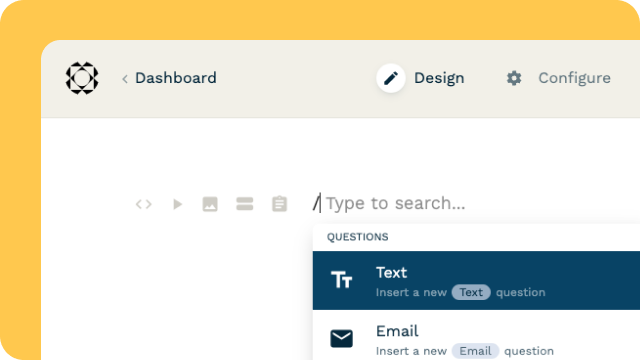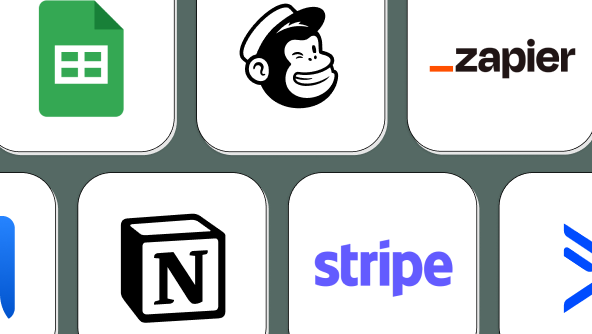
All Solutions

Explore all the solutions you can create with Paperform: surveys, quizzes, tests, payment forms, scheduling forms, and a whole lot more.
See all solutions











Connect with over 2,000 popular apps and software to improve productivity and automate workflows
See all integrationsSolutions
All Solutions

Explore all the solutions you can create with Paperform: surveys, quizzes, tests, payment forms, scheduling forms, and a whole lot more.
See all solutionsIntegrations

Connect with over 2,000 popular apps and software to improve productivity and automate workflows
See all integrationsResources
7 starter templates for small business owners

From your favourite coffee shop to your local hardware store, small businesses are the backbone of a thriving community. They make our lives better. At Paperform, we think they deserve a little extra love.
That’s why we’ve rounded up the seven best Paperform starter templates for small business owners. From scheduling appointments to managing customer service inquiries, these forms can help small business owners streamline their workflows, and automate everyday processes.
Whether you run your business online, in person, or both, these ready-to-go templates are here to help you boost profits, manage your team, sell your goods, and make your life just a little bit easier.
1. Interview Form Template
interview form
On a small team, every person is essential. That’s why it's so important to hire employees who understand your company vision and fit in with the workplace culture you’re creating. But when you’re running a business and trying to maintain a healthy work-life balance, you might not have a ton of time to find that perfect candidate.
Why not let Paperform handle some of the search for you? This ready-to-go interview form template is a great way to filter through potential candidates before you start the in-person or video interview process. That way, you can reserve your precious time for candidates who match your needs.
Just list the interview form on your website, and let candidates fill it out on their own time. When you have a minute, you can review your responses and follow up with the candidates that pique your interest. It’s easier for you, easier for them, and nobody gets their time wasted. Win, win, win.
2. Scheduling Form
scheduling form
When you do find those special candidates, there’s no alternative to a face-to-face or video call meeting. But finding a time to meet can be a hassle, especially when you’re working with multiple candidates and multiple schedules.
Instead of getting sucked into an endless back-and-forth email chain, send over this Paperform. List your available times in our dedicated calendar view appointment field, let your candidates select a time that works for them, and have Paperform handle the rest. Easy peasy.
The best part? You can make double booking a thing of the past by connecting your form with your Google Calendar.
With this integration in place, your meeting will be automatically scheduled in your calendar when your candidate submits the form. Pair this with automatic, personalised email reminders and you’ve got an interviewing system that runs all by itself.
3. Feedback Form
client feedback form
There are few better ways to improve your business than by listening to customer feedback. Staying aware of your customer's pain points and fixing them quickly is a sure-fire way to boost loyalty, customer retention, and overall ratings.
But when you bombard customers with lengthy feedback forms and surveys, you can inadvertently cause the opposite effect. Tedious, poorly made feedback forms can leave your customers exhausted, turn them away, or even sway their responses to the negative.
The solution? Sleek, effortless feedback forms that respondents don’t dread filling out. This template is the perfect place to start. It’s stylish, straightforward, and easy to customise to match your brand and product. Just add your information and share it after a customer support experience, or as part of a monthly newsletter.
4. Product Order Form
product order form
Paperform may have started as a form builder, but it’s grown into a whole lot more than that. You can run an entire ecommerce store using our versatile digital suite of tools.
If you're looking to sell goods online, this template is the perfect place to start. Don’t get lost in the forest of Etsy shops, or lose half of your profits in commission and fees. With Paperform, simply list your goods, connect your payment accounts, and let the money roll in.
Form a better life now.
This product order template can easily be customised for anything you’re selling. You can also add features like automatic taxation and receipt generation, custom PDFs, and discount codes right from the configuration menu.
Paperform is an increasingly popular Shopify alternative and can connect with all your favourite payment pathways, including Stripe, Paypal, and Braintree. And unlike the other ecommerce platforms, we never take a cent of your money in processing fees or commission.
5. Call Back Form
call back form
Mighty as they may be, small businesses still face challenges because of their size. Not every company has the breadth (or budget) for a full-time, 24-7 customer support team. But when swift response times and excellent customer service are essential, you have to get creative.
Enter: the callback form. With this template, you can give each customer the attention they deserve, without a full-time customer service team. Your customers can reach out at any time for help with technical support or product inquiries, and you can call them back when it’s convenient.
They don’t have to wait on hold, and you maintain the excellent customer service you pride yourself on. You could even add an automatic email response to let customers know you’ve received their inquiry and will be with them shortly.
6. Time Off Request Form
time off request form
Every employee needs time to rest and recharge. To avoid confusion and burnout, it’s important to have a streamlined, organised process for requesting leave. This time off request template helps you do just that. It gathers all the information you need to know about your employees' leave in an easy-to-understand, uniform way.
With this template, your employees don't need to find the time (or courage) to ask their team leader for time off in person. Team members can input their desired dates from any device, and management can process and approve requests on their own time. No more awkward phone calls or bidding for that extra day on the holidays.
Processing leave requests online is easier for your employees and your human resources team. All the relevant data can be shared across platforms, so you can update your HR management software automatically. You could even add a few fields where your employees can delegate tasks and projects to coworkers during their time away.
7. Newsletter Signup Form
newsletter signup form
There’s a thin line between running an active newsletter and bombarding your customers with too many emails. One of the best ways to avoid tipping the scale is to ensure that everyone on your email list actually wants to be there. This template helps you do just that.
Rather than siphoning customer emails from a previous purchase or interaction, you can embed this newsletter sign-up form anywhere on your website and let folks join when they want. Stay connected with your community, without overloading their inbox.
Run your small business with Paperform
Running a small business is no easy feat. With these seven starter templates, Paperform can help make it just a little bit easier. From managing your employees to selling products online, these templates can help your small business start running itself.
Looking for something a little different? No problem. Paperform has over 650 custom-made templates in our library, each one designed with a specific purpose in mind.
With so many unique options to choose from, you’re bound to find something that piques your interest. Give it a go yourself with our 14-day free trial, no credit card required.
Paperform Contributor
Deepak (Dee) Shukla, the dynamic founder of Pearl Lemon, built the leading SEO agency in London by l...
Here is the ultimate list of online form builders, what they do best, their pricing, and examples to...
When Luiz Sifuentes lost the platform powering his entire web design business, he rebuilt smarter—wi...
All of our product updates and big company news for Paperform and Papersign from Oct 24 - May 25 to ...